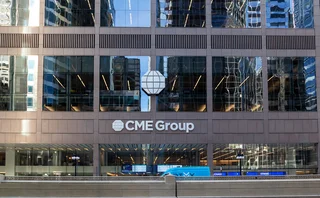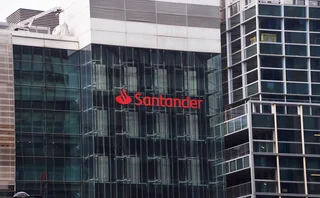
Oil & Products House of the Year, Asia: Deutsche Bank

Deutsche Bank wins this year's Oil & Products House of the Year, Asia award. In a difficult year for oil trading, Deutsche Bank has gained market share, increasing volumes by as much as 50% in products such as Brent crude options and Singapore fuel oil, while steadily expanding its physical capabilities and offering innovative structuring and financing solutions.
Stuart Smith, head of Asian commodity sales at Deutsche Bank, attributes the bank's success in oil and products to its very deliberate decision to tread a fairly unique path for an investment bank; putting equal emphasis on its execution business and its balance-sheet offering.
"At Deutsche Bank there has been a distinct move towards a hybrid model – we took the decision to add a lot more balance-sheet [funding] solutions to our flow-driven business model," he says. "I think having a good blend of aggressive, client-friendly flow products combined with giving balance sheet to the client has been a win-win strategy," he adds. "It's having a blend of both that affects the stability and performance of the business. Both flow and providing funding solutions are equally important to us."
Developing this business model has allowed Deutsche Bank to take advantage of two major current trends in the market – corporations regaining their appetite for more complex structures while at the same time becoming more capital-constrained as oil prices rise, so requiring better financing solutions. In addition, the bank has focused on developing cross-product solutions to support clients who face a combination of currency, interest rate and energy price risk.
The bank has used the combined strength of various departments such as treasuries and foreign exchange alongside a general sales team that has cross-product sales expertise to take a more 'holistic' approach to client service. "The use of innovative, complex risk structures again in the marketplace has been very successful for us," says Smith.
"With many Asian corporations having balance-sheet constraints and needing more capital, Deutsche Bank has concentrated on offering commodity-linked products, often taking physical delivery, with tight financing and hedging execution around it," says Smith.
In a recent transaction the bank enabled an Asian power company to hedge both its foreign exchange and fuel oil exposure in a single transaction. The client needed to buy oil swaps to lock in its electricity generation margins. However, a plain US dollar oil swap would leave it with foreign exchange exposure as their revenues were in local currency. Deutsche Bank was able to structure a transaction where the client was able to hedge its oil exposures in US dollars and overlay it with a local currency hedge. In traditional local currency hedges, net cash settlements occur at month-end after fixing in local currency, but this was structured such that the entire notional plus the differential payments were netted and settled against the local currency.
As well as excellent cross-department co-ordination, the bank's pricing platforms also helped offer competitive pricing and execution for the client, says Smith.
Of particular note is Deutsche Bank's proprietary electronic trading system, Autobahn, which gives access to both foreign exchange and commodities on a single platform.
"Autobahn allows our clients to directly execute transactions from the comfort and convenience of their own desktop computer," says Smith. "It is installed on the client's server and enables access to an increasing number of forex and commodities markets."
Another development for Deutsche Bank has been the recent launch of a night desk that runs out of London, with a trader dedicated solely to the Asian market.
"We're one of the few banks to offer this service and it means that clients don't have to worry about their positions or stop trading after the Singapore market closes," says Smith. "The Singapore night desk will notify clients of any large moves in their positions whenever they occur throughout the night should the client request it," he says. "It means Asian clients are now able to make use of key liquidity times and can benefit from favourable price moves."
Only users who have a paid subscription or are part of a corporate subscription are able to print or copy content.
To access these options, along with all other subscription benefits, please contact info@risk.net or view our subscription options here: http://subscriptions.risk.net/subscribe
You are currently unable to print this content. Please contact info@risk.net to find out more.
You are currently unable to copy this content. Please contact info@risk.net to find out more.
Copyright Infopro Digital Limited. All rights reserved.
As outlined in our terms and conditions, https://www.infopro-digital.com/terms-and-conditions/subscriptions/ (point 2.4), printing is limited to a single copy.
If you would like to purchase additional rights please email info@risk.net
Copyright Infopro Digital Limited. All rights reserved.
You may share this content using our article tools. As outlined in our terms and conditions, https://www.infopro-digital.com/terms-and-conditions/subscriptions/ (clause 2.4), an Authorised User may only make one copy of the materials for their own personal use. You must also comply with the restrictions in clause 2.5.
If you would like to purchase additional rights please email info@risk.net
More on Risk management
Clearing members ponder the purpose of CME’s mystery FCM
Some think licence will be used to boost crypto clearing capacity, but many questions remain
Review of 2024: as markets took a breather, firms switched focus
In the absence of major crises and rules deadlines, financial firms revamped strategy, services and practices
As supplier risk grows, banks check their third-party guest lists
Dora forces rethink of KRI and appetite frameworks amid reappraisal of what constitutes a key counterparty
Dora flood pitches banks against vendors
Firms ask vendors for late addendums sometimes unrelated to resiliency, requiring renegotiation
Quant Finance Master’s Guide 2025
Risk.net’s guide to the world’s leading quant master’s programmes, with the top 25 schools ranked
Regionals built first-line defences pre-CrowdStrike
In-business risk teams vary in size and reporting lines, but outage fears are a constant
Op risk data: Santander in car crash of motor-finance fail
Also: Macquarie fined for fake metals trade flaws, Metro makes AML misses, and Invesco red-faced over greenwashing. Data by ORX News
Public enemy number one: the threat to information security
Nearly half of domestic and regional banks report risk appetite breaches amid heightened sense of insecurity







